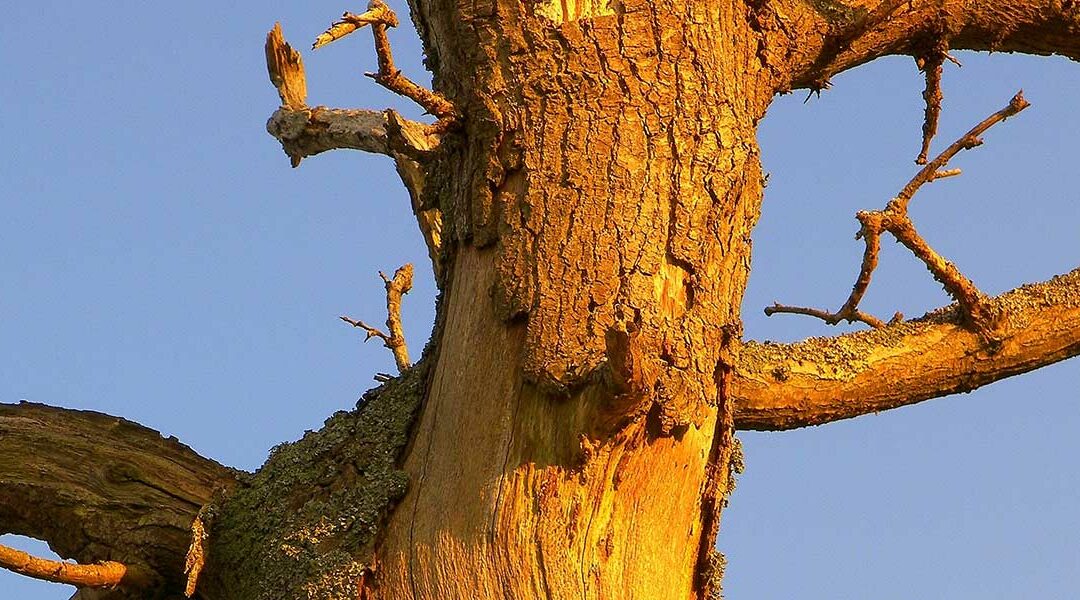You’ve noticed bark peeling off the trunk of your favorite tree. It isn’t just bits; it’s coming off in sheets, and you pull a few big pieces right off. “Why is the bark falling off my tree?” you wonder, examining the discarded chunks in your hands.
New Leaf Tree Service’s crew has seen this phenomenon during our tree services in Louisville, KY. We’ll explain why it happens and what to do about it below.
The Bark Falls Off Your Tree For These Reasons
Tree bark is the protective, outermost tissue layer that trees develop around their interior wood material. It shields the tree’s vulnerable tissues. The bark functions much like your skin, so there’s a problem if you’re suddenly asking, “Why is the bark falling off my tree?”
That’s a Normal Species Characteristic
Some tree species undergo constant tree bark shedding because it’s a feature, not an ailment. For example:
- Sycamores feature camo-like bark patterns.
- Shagbark hickory peels vertical layers of bark.
- River birch is characterized by the big papery layers of bark it sheds.
These specimens are kind of like snakes; as they grow, they lose their outermost bark layer to reveal fresh, new bark underneath.
Extreme Heat Is Drying It Out
Is your area under a drought or extreme heat advisory lately? These weather patterns can result in bark damage if you don’t mitigate them for your trees.
Intense heat coupled with poor hydration dries the tree tissues out. The dry bark shrinks and cracks once it no longer fits the tree. Occasional watering during summer and annual mulching mitigate the drying effects of drought and hot weather.
There Are Rapid Warming and Cooling Cycles
The environmental stress of unpredictable winters can also impact your tree’s health. A particularly cold winter in Louisville, Kentucky, can bring frigid night temperatures followed by much warmer, sunny days. The cold, nighttime air shrinks the bark to its limits.
“So, why is the bark falling off my tree?” As the sun rises, it quickly reheats the tree. The bark expands and cracks from this perpetual cycle of expansion and contraction.
Try wrapping the trunk in burlap or another insulating material to protect vulnerable specimens on your property.
A Fungus or Pest Has Overtaken It
Tree pests and fungi can also cause extensive bark damage. In cases of a pest infestation, some beetle species use the tree as a giant home. They create tunnels with larger open cells for their offspring. Their boring and digging activity can loosen the bark, causing the tree to shed it prematurely.
As far as a fungal infection goes, some fungi feed on the outer tissues until they detach and die. They may create big, gaping cankers or eat away at the tissues until they feel soft and mushy. Annual pest and fungal prevention protects vulnerable specimens from falling prey to these organisms.
Your Tree Has a Traumatic Injury
Blunt force trauma can also force a tree to shed its bark. If, for example, a lightning bolt strikes the specimen, the electrical power can split the bark as it passes. Eventually, the injured bark will begin to peel away.
Other blunt force injuries may come from vehicle impacts, bad pruning cuts, and even deer rubbing their antlers on vulnerable tree trunks. A weakened specimen may also get sick from an opportunistic tree disease, worsening its health.
Why Is the Bark Falling Off My Tree? New Leaf Tree Service Can Tell Me Through Tree Health Care Services in Louisville, Kentucky
Check these signs of a sick tree to see if a disease is to blame. Then, call New Leaf Tree Service at 502-419-9899 for top-notch tree health care services in Louisville, Kentucky.

